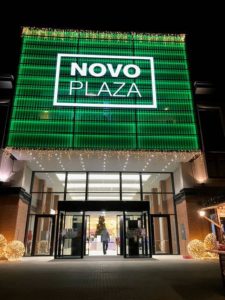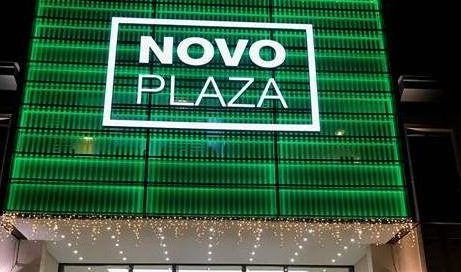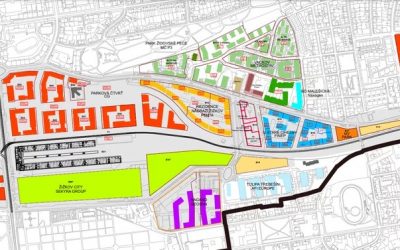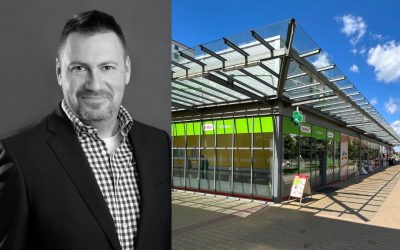Older and wiser. That’s how a lot of business leaders feel nearly a year into the pandemic, but especially retailers and their landlords. “It’s provided more clarity on a number of future unknowns,” says Iain Fanthorpe, director of the real estate investor Bluehouse, owner of shopping centers in Karvina and Novo Plaza in Prague 4.
 “You sensed that there was this ‘yes things are changing’ rhetoric but no one quite knew fully what direction or speed they were changing…Everybody who’s been working in retail knew that it was an evolving sector and COVID has likely accelerated the evolution,” he continues. “Of the three commercial sectors, probably retail was changing the most rapidly and actually in need of evolution, because elements of retail are still working the way it 5 or 10 years ago, to be honest.”
“You sensed that there was this ‘yes things are changing’ rhetoric but no one quite knew fully what direction or speed they were changing…Everybody who’s been working in retail knew that it was an evolving sector and COVID has likely accelerated the evolution,” he continues. “Of the three commercial sectors, probably retail was changing the most rapidly and actually in need of evolution, because elements of retail are still working the way it 5 or 10 years ago, to be honest.”
Speaking of change, the pandemic struck just as Bluehouse had begun a long-planned modernization of Novo Plaza, the investor’s well-located but tired-looking shopping center built 20 years ago from the frame of an existing industrial building. Fanthorpe says the first lockdown hit just as work on a complete reconstruction of the bathrooms had gotten underway. The unexpected reduction of shoppers allowed Bluehouse to carry out construction work more easily, of course. But this benefit was drastically outweighed by the chaos caused by many of his tenants being thrown into existential uncertainty.
The company’s response to this crisis, it turns out, was to plunge into an exhaustive dialogue process that forced it to listen to the problems and the concerns of dozens of clients. But it was precisely what they found out while listening during these troubled times which Fanthorpe says has brought new insights.
“E-commerce was always the elephant in the room,” he says, providing just one example. It’s not as if no one was talking about the growing beast, but while brick & mortar landlords pay lip service to the idea of omnichannel sales, you often get the feeling that deep down, they see this as a zero-sum game. A contest in which every dollar spent online is a dollar not spent in a real store.
Enter the pandemic. Suddenly, with a common mortal enemy to fight, landlords and tenants see with brutal clarity that they’re utterly dependent on each other. For some, especially those with good relationships from the beginning, this led to pragmatic, open discussions between parties. Fanthorpe describes how certain retailers moved with amazing speed to create online options for their customers to order and pick-up goods.
But enabling them to do this was just part of a new dynamic that took shape during those first months. “What we found is that all the stakeholders involved were actually working in the same direction,” explains Fanthorpe. “It was a momentum that started off as it would have historically, with landlord and tenant on either side of the divide. But as time went on, as both parties understood each other’s parameters, you saw the sides get closer together…Now (and it’s still evolving and changing) you’re seeing landlords working with tenants on a far greater day-to-day level – from supporting subsidy programs to operational and marketing needs. You’re seeing stakeholders coming together because we’re all in the same boat.”
While warning that it might seem like an obscure detail, Fanthorpe relates how a tenant requested it be allowed to reserve parking spots for its clients to use as a pick-up point. He says this is precisely the sort of odd request that landlords might not have met with enthusiasm b.p. (before the pandemic). “It’s such a minor detail but we now see that we can potentially allocate collection points within the shopping center or re-configure customer parking to assist tenants online needs. It doesn’t cost us anything but it means a lot to the tenant. It’s about combining forces rather than competing with each other.”
If retail parks have proved resilient during the pandemic, Fanthorpe says that local, service-oriented centers like Novo Plaza aren’t far behind. It’s not just that a higher percentage of its stores were able to stay open under the restrictive measures. He’s also less dependent on the big international fashion brands, some of whom are fighting their landlords in high street and regional mall locations.
That being said, Fanthorpe says he has high hopes for the extensive renovation work that’s still underway. During the first two phases of the €5 million investment, the parking, the bathrooms, the atrium, and the entrance areas were renovated and a fancy new fronting façade (plus a new logo) was installed to give the mall a completely fresh look. Last week, Bluehouse moved on to the third phase which involves the full cosmetic upgrade to the common area plus the back façade and landscaping. Together with the new appointment of a shopping center manager through CBRE, Fanthorpe is confident about how Novo Plaza will perform once the current troubles recede. The trick, of course, will lie in getting there with minimal damage.
Also in thePrime:






